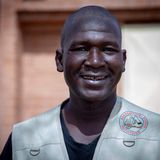Join us for an immersive evening, with speakers who will flip the script on climate justice and -resilience. We will be joined by Saïdou Temé from Pays Dogon in Central Mali, who like no other can show us what climate resilience looks like in practice. Building on his community-centered approach, we will zoom out with Fatima Denton who vice-chairs the IPCC working group on adaptation. A panel that brings together both government and non-governmental thinkers and doers will bring the conversation back to The Netherlands and how we can each find our leverage for system change. Which approaches might truly foster climate resilience? Our conversations and reflections will be infused by images from Pays Dogon and music by Amara Diabate.







About the speakers
Saidou Teme is the director of The Dogon Initiatives Association (ADI) for the past 13,5 years. ADI is a national non-profit NGO in Mali that contributes to the welfare of underprivileged populations in the Bandiagara region in general and those of the Dogon country in particular. They improve their health, education and economic situation and their sustainable access to drinking water and sanitation. They do that through participatory, innovative and awareness-raising methods adapted to support municipal project management. With the support of the Dutch organisation Partners Pays-Dogon (PPD), they have been actively involved for the last 25 years.
Danielle Hirsch is a member of parliament for the Dutch Green Party (PvdA/GroenLinks). Previously, she was director of environmental- and human rights organisation Both ENDS. She has worked within global civil society networks of social movements and engages with a wide range of actors in the Netherlands, challenging its trade and investment agenda to move towards a foreign policy agenda that supports sustainable futures for people everywhere.
Hugo Verkuijl is Senior Policy Advisor Food and Nutrition Security at the Ministry of Foreign Affairs. Previously, he gained experience working with civil society organisations (Hivos and Welthungerhilfe), private sector (Solvert) and research organisations (KIT and CIMMYT). He lived and worked in Mali for almost 15 years in various positions such as consultant to the National Agricultural Research Institute of Mali, as director of a social enterprise and as programme director of Welthungerhilfe Mali. In the Netherlands he worked with Hivos on topics of climate justice and contributing to sustainable food systems. Main themes in his work are strengthening the position of smallholder farmers, adaptation to climate change, gender and entrepreneurship.
Jurriaan van Stigt has been chairman of the Partners Pays Dogon foundation (established in 1995) since 2009. PPD is dedicated to the sustainable improvement of living conditions for residents of Pays Dogon. Increasingly, the Partner organization Association Dogon Initiatives (ADI) takes the lead in this, as indicated by the residents of Pays Dogon. They honor the vision that local leadership is the key to development. It is not them, but the residents of Pays Dogon, and the employees of ADI, who know best what is needed and how it can be achieved. Based on mutual trust, they actively collaborate and learn from and with each other. They move from the bottom up. Together with the population, with an integrated approach and a focus on self-reliance, local ownership, and entrepreneurship. Jurriaan is also the founding Partner of LEVS architects and, together with partners Marianne Loof, Adriaan Mout, Surya Steijlen, and Chris Schuit, they also support the activities of the Foundation from the office.
Dr. Fatima Denton is a distinguished leader within the UN system, currently serving as the Director of the United Nations University Institute for Natural Resources in Africa (UNU-INRA). With a wealth of experience in natural resource management and policy development, she previously held key positions at the United Nations Economic Commission for Africa (UNECA) and the International Development Research Centre (IDRC). Dr. Denton’s contributions extend to international climate change research, notably as a lead author for several IPCC reports. Holding a PhD in Political Science, her academic pursuits and leadership roles emphasize the importance of just transitions, particularly in Africa, where she aims to amplify the voices of affected communities.
Amare Diabate, founder of Djembe-Amare, comes from a griot family lineage of musicians and storytellers. Inspired by his grandfather and mother, both revered in their craft, Amara began his musical journey at the age of twelve, mastering the djembe and later expanding his repertoire to include various traditional African instruments. Having traveled extensively across Africa, he later settled in the Netherlands in 1994, where he shares his expertise through teaching djembe courses and workshops. Amara’s performances, both solo and with his group Super Landaya, captivate audiences with their infectious energy and joyous expression. Believing that music is an avenue for emotional connection and pleasure, Amara radiates passion in his teaching and performances, enriching the musical landscape with his Griot heritage.
Carol Gribnau has a background in natural resources management and extensive working experience in the global South, she has been working throughout her career at the people-planet interface. Her working experience covers a wide range of civil society organisations: from international NGOs to farmers’ and women’s organisations. Next, she was actively engaged in numerous collaborations with governments, private sector and financial institutions. In her position as Program Director Green Society for Hivos she put green entrepreneurship on the agenda and was actively involved in the collaboration with, amongst others, the Triodos Bank and member of the supervisory board of the Triodos Sustainable Trade Fund. She was also instrumental in the development of the Hivos Food & Lifestyle Fund, which invests in local SMEs in Southern Africa that enhance local sustainable food systems. Carol strongly believes that the transition to a more equal and ecologically sustainable society is not only necessary but also feasible. In January 2021 she was appointed Director of the DOEN Foundation. The DOEN Foundation believes that a green, social and creative world is possible and that engaged, entrepreneurial people are a major driving force. The DOEN Foundation supports them through a range of non-financial and financial instruments – such as subsidies, loans and equity – that allow them to grow, become stronger and more visible.






